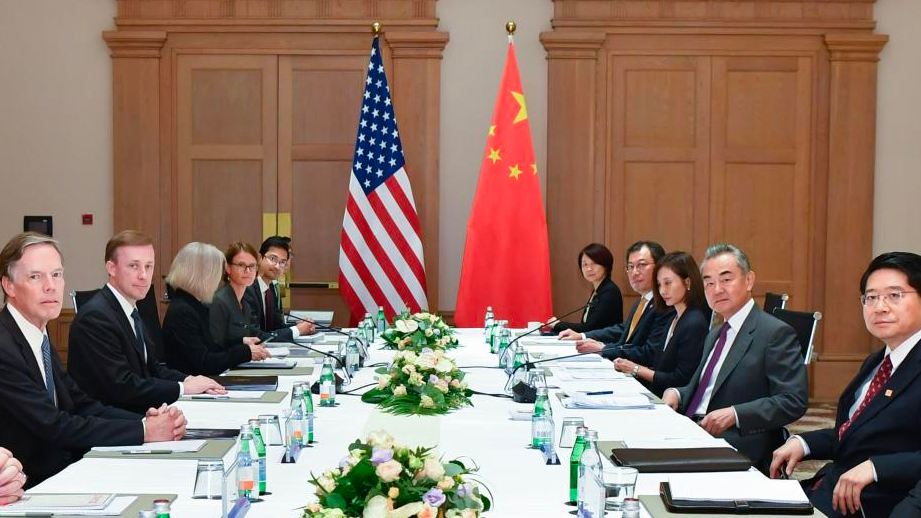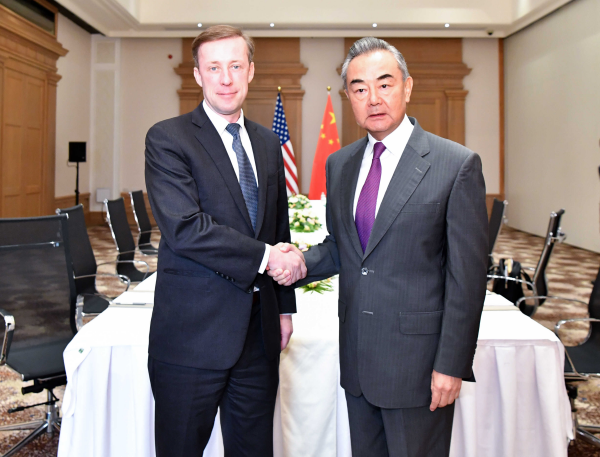
Wang Yi, a member of the Political Bureau of the Communist Party of China (CPC) Central Committee and director of the Office of the Foreign Affairs Commission of the CPC Central Committee, holds several rounds of talks with U.S. National Security Advisor Jake Sullivan in Malta, from September 16 to 17, 2023. [Photo/Xinhua]
By Kulsum Begum
Director of the Foreign Affairs Commission of the Communist Party of China Central Committee Wang Yi and U.S. National Security Advisor Jake Sullivan held multiple rounds of meetings in Malta recently, signaling further attempts to stabilize the world's most critical nation-to-nation relations. They committed to maintain high-level interaction and consult on Asia-Pacific, maritime, and foreign policy problems. The discussions' frankness, content, and constructive narrative for stabilizing and enhancing China-U.S. ties reveal their geopolitical concerns.
The talks between Wang and Sullivan were the latest in a series of high-profile exchanges of views between China and the U.S., indicating that Beijing and Washington are trying to restore communications to better manage their differences and avoid conflict. With their collaboration and involvement needed to solve global issues, China and the U.S. should resume detente. But whether the U.S. can follow through on its statements will determine if the momentum toward that can be sustained.
China always wants the well-being of all nations because it believes in a win-win situation. For example, on September 12, Chinese President Xi Jinping wrote to Sino-American Aviation Heritage Foundation Chairman Jeffrey Greene and Flying Tigers veterans Harry Moyer and Mel McMullen that China and the U.S. share responsibilities for international peace, stability, and prosperity.
On September 19, Chinese Vice President Han Zheng said climate change negotiations between China and the U.S. are important for both nations and the globe. Han said this in New York at a meeting with the U.S. Special Presidential Envoy for Climate John Kerry during the 78th United Nations General Assembly.
Despite tensions, high-level discussions between Chinese and U.S. officials and sending Vice-President Han Zheng to the UN General Assembly are noteworthy. These diplomatic activities will shape the relationship between the two countries. After many top U.S. diplomats and officials returned from China, Wang and Sullivan resumed negotiation. Some observers said the Wang-Sullivan conversations summarized previous high-level contact between the two nations, raising worries about their future.
However, the Taiwan question remains the top red line for the China-U.S. relationship. Wang stressed that the U.S. must honor the three China-U.S. joint communiques and not back "Taiwan independence." The general China development prediction was also discussed. Wang claims that China's rise is driven by strong endogenous factors that follow a certain historical course and cannot be stopped. He emphasized that "The Chinese people cannot be deprived of their legitimate right to development."
The two sides agreed to follow the Bali agreement, maintain high-level interactions, and undertake China-U.S. dialogues on Asia-Pacific, maritime, and foreign policy. The two sides also discussed ways to boost people-to-people interactions. The U.S. should stick to its already-committed strategy since the one-China principle is a crucial issue in the context of bilateral ties with China.

Wang Yi (R), a member of the Political Bureau of the Communist Party of China (CPC) Central Committee and director of the Office of the Foreign Affairs Commission of the CPC Central Committee, holds several rounds of talks with U.S. National Security Advisor Jake Sullivan in Malta, from September 16 to 17, 2023. [Photo/Chinese Foreign Ministry]
The Malta conversations were important for strategic bilateral communications. They showed that both countries were ready to address important topics, indicating future positive relations. Though diverse in perspective and policy execution, both countries have shown a common commitment in preserving and improving stable communications. These strategic talks also showed that major countries need top-level interactions to understand geopolitical processes and prevent conflicts.
This type of bilateral engagement shows that China and the U.S. should have generalized communications and a genuine mutual deep understanding of their core issues, which have laid the groundwork for strategic coordination and cooperation. The strategic channel is critical for maintaining a smooth high-level communication channel and setting the direction of China-U.S. relations throughout the year.
The bilateral relationship's historical and present difficulties exist, but their dedication to collaboration on crucial topics reveals an intuitive appreciation of each other's strategic importance. Whether these talks will improve relations or preserve the status quo is unknown. However, the appeals for mutual understanding, strategic communication, and constructive criticism indicate maturity in handling difficult geopolitical issues between China and the U.S., two global powerhouses.
The current engagement opens up future contacts between the two nations' heads of state after Washington made tactical modifications in interacting with China by demonstrating good gestures and improving communication. The U.S. must interact with China to prevent escalating tensions, a cold war mindset and competitiveness.
However, the appeals for mutual understanding, strategic communication, and constructive engagement indicate maturity in handling difficult geopolitical issues between China and the U.S. The Biden administration must cease suppressing China's growth and stop questioning the red lines to normalize bilateral ties.
Diplomacy and negotiation are essential to resolving disputes and maintaining ties. High-ranking leaders from both nations have called for fresh choices and initiatives to achieve success and development. The world is watching whether China-U.S. ties might deteriorate or improve.
If the U.S. wants to cooperate with Beijing to manage China-U.S. relations, it should use the opportunity to address some of the long-standing trade disagreements, expand economic connections, and explore new trade and investment possibilities. Building trust and bridges between the two economies will make their relationship more secure and cooperative through bilateral understandings and engagement.
Kulsum Begum, a special commentator on current affairs for CGTN, is a security and strategic affairs researcher and freelance columnist.

 中文
中文



